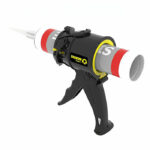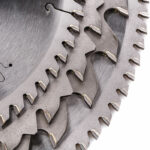Using the right tools for your construction or home improvement projects can make a big difference. Find out what two products we can’t live without, and learn how to choose the right circular saw blade for your project.
Must-have tools for drywall and insulation projects
Share this project

Rodless caulking gun
This innovative compact caulking gun by Siligun is just 4 inches long allowing it to reach extremely narrow spaces. It has a blade in the back that cuts through the tube from behind while moving the tube forward. The excess tubing at the back can be cut off to reach even tighter areas.
The no-drip design means the flow stops when the trigger is released. It's compact size makes it easy to store in any toolbox. With a powerful 12:1 thrust ratio, Siligun works with any standard plastic 10 oz cartridges / sausage packs (310 ml). Siligun can handle latex, acrylic, silicone caulks and similar compounds.
O#5589296

Rodless caulking gun
This innovative compact caulking gun by Siligun is just 4 inches long allowing it to reach extremely narrow spaces. It has a blade in the back that cuts through the tube from behind while moving the tube forward. The excess tubing at the back can be cut off to reach even tighter areas.
The no-drip design means the flow stops when the trigger is released. It's compact size makes it easy to store in any toolbox. With a powerful 12:1 thrust ratio, Siligun works with any standard plastic 10 oz cartridges / sausage packs (310 ml). Siligun can handle latex, acrylic, silicone caulks and similar compounds.
O#5589296

Types of circular saw blades
There are basically four types of circular saw blades; rip-cut, crosscut, combination and specialty. The type of blade you need will depend on the project you're working on.
Rip-cut
For cutting along the grain of the wood, most commonly along the length of a board.
Crosscut
For cutting a length of wood, across the woodgrain.
Combination
These are general purpose blades and can make both rip-cuts and crosscuts.
Specialty
Specialized blades are engineered to cut certain materials like metal, masonry, tile and pipe. They can also be engineered for fine finish cutting or cutting through wood with
nails or other foreign objects.
Facts to keep in mind
- Blades with more teeth cut finer, blades with fewer teeth cut faster.
- The space between teeth clears debris during cutting, deep spaces means more aggressive and faster cutting.
- Expansion slots prevent warping and vibration as the blade heats during cutting, creating a straighter cut.

Types of circular saw blades
There are basically four types of circular saw blades; rip-cut, crosscut, combination and specialty. The type of blade you need will depend on the project you're working on.
Rip-cut
For cutting along the grain of the wood, most commonly along the length of a board.
Crosscut
For cutting a length of wood, across the woodgrain.
Combination
These are general purpose blades and can make both rip-cuts and crosscuts.
Specialty
Specialized blades are engineered to cut certain materials like metal, masonry, tile and pipe. They can also be engineered for fine finish cutting or cutting through wood with
nails or other foreign objects.
Facts to keep in mind
- Blades with more teeth cut finer, blades with fewer teeth cut faster.
- The space between teeth clears debris during cutting, deep spaces means more aggressive and faster cutting.
- Expansion slots prevent warping and vibration as the blade heats during cutting, creating a straighter cut.
Browse More Projects
A fresh coat of paint is an instant style update that can be easily done over the span of a...
Owning a house comes with yard work and outdoor maintenance and that means you’re going to need garden tools. There...
Reach for a concrete sealant if you need to fix cracks in garage floors, sidewalks, driveways, or other concrete floor...



